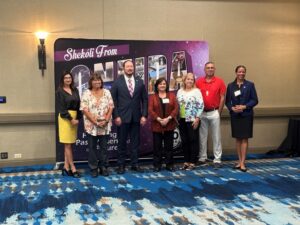Centers for Disease Control and Prevention (CDC) Tribal Advisory Committee Meets and Visits Local Tribal Health Center
Centers for Disease Control and Prevention (CDC) Tribal Advisory Committee Meets and Visits Local Tribal Health Center
The Centers for Disease Control and Prevention (CDC) Tribal Advisory Committee (TAC) meeting was hosted by the Oneida Nation in Green Bay, Wisconsin on September 6-7. The CDC Tribal Advisory Committee advises the CDC and the CDC Director on policy and programmatic efforts that affect American Indian and Alaska Native (AI/AN) health. The TAC works with CDC leadership to exchange information about public health issues, provide guidance, and ensure that AI/ANs and Tribes are included in all public health efforts. National Indian Health Board staff attended the CDC TAC Meeting and provided technical assistance to Tribal leaders.
Topics covered during the meeting included CDC budget, Indigenous knowledge, improving Tribal access to public health data with electronic case reporting, evaluation, and maternal mortality prevention, among others. Tribal leaders serving on the TAC emphasized the importance of equitable funding for public health in Indian Country. TAC members also requested that the CDC provide more transparency about which non-Tribal entities have access to Tribal public health data and for which purposes. Another issue raised was the absence of CDC Director Mandy Cohen from the TAC meeting, observing that President Biden has stated that it should be a priority of federal agencies to proactively engage with Tribal leaders and Tribal advisory committees, and that requires participation from top agency leadership. Other discussions included the vital role of Indigenous knowledge and culture in health. As explained by the TAC Chair and Deputy Principal Chief Bryan Warner of the Cherokee Nation, “What we’re finding is that there’s healing in our language.”
CDC officials provided updates to the TAC from different divisions. CDC Behavioral Scientist and Evaluator Stacey Ann Willocks shared that their Indigenous Evaluation Toolkit is in the process of being adapted for use across all types of public health programs. CDC Chief Evaluation Officer of the Office of Policy, Performance, and Evaluation, Daniel Kidder, also shared that the CDC is working on a refresh of the CDC framework for evaluation that includes cultural competency considerations and health equity.
The TAC meeting included a site visit to the Oneida Community Health Center. Oneida Community Health Center is part of the Oneida Nation’s Comprehensive Health Division and strives to provide “the highest level of quality, culturally sensitive, holistic, and preventive health care” to Oneida citizens. Hosts of the health center visit shared the importance of patient-centered, culturally-informed design, noting that the health center building incorporates elements of traditional longhouse design and many Onei da design motifs.
da design motifs.
The CDC TAC noted the many open seats on the committee and the need for more Tribal representatives and alternates. The CDC TAC consists of 17 representatives: 1 delegate (and 1 alternate) from a federally recognized Tribe from each of the 12 Indian Health Service Areas, and 1 delegate (and 1 alternate) from 5 National At-Large Tribal Member (NALM) positions. If you are interested in joining the TAC and helping to ensure the federal government upholds its trust responsibility and honors the government-to-government relationship, NIHB can offer support. If you have questions on the process or want assistance in the nomination process, please contact Garrett Lankford, NIHB Federal Relations Analyst, at [email protected] or 202-996-4302.